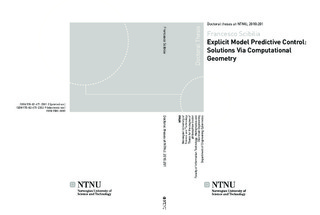Explicit Model Predictive Control:Solutions Via Computational Geometry
Doctoral thesis
Permanent lenke
http://hdl.handle.net/11250/260258Utgivelsesdato
2010Metadata
Vis full innførselSamlinger
Sammendrag
The thesis is mainly focused on issues involved with explicit model predictive control approaches. Conventional model predictive control (MPC) implementation requires at each sampling time the solution of an open-loop optimal control problem with the current state as the initial condition of the optimization. Formulating the MPC problem as a multi-parametric programming problem, the online optimization effort can be moved offline and the optimal control law given as an explicitly defined piecewise affine (PWA) function with dependence on the current state. The domain where the PWA function is defined corresponds to the feasible set which is partitioned into convex regions. This makes explicit MPC solutions into promising approaches to extend the scope of applicability of MPC schemes. The online computation reduces to simple evaluations of a PWA function, allowing implementations on simple hardware and with fast sampling rates. Furthermore, the closed form of the MPC solutions allows offline analysis of the performance, providing additional insight of the controller behavior.
However, explicit MPC implementations may still be prohibitively costly for large optimization problems. The offline computational effort needed to solve the multiparametric optimization problem may be discouraging, and even the online computation needed to evaluate a complex PWA controller may cause difficulties if low-cost hardware is used.
The first contribution of this thesis is to propose a technique for computing approximate explicit MPC solutions for the cases where optimal explicit MPC solutions are impractical due to the offline computational effort needed and their complexity for online evaluations. This technique is based on computational geometry, a branch of computer science which focuses heavily on computational complexity since the algorithms are intended to be used on large data-sets. The approximate solution is suboptimal only over the subregion of the feasible set where constraints are active. In this subregion, the ineffective optimal explicit MPC solution is replaced by an approximation based on Delaunay tessellations and is computed from a finite number of samples of the exact solution. Finer tessellations can be obtained in order to achieve a desired level of accuracy
Successively, the thesis presents a twofold contribution concerned with the computation of feasible sets for MPC and their suitable approximations. First, an alternative approach is suggested for computing the feasible set which uses set relations instead of the conventional orthogonal projection. The approach can be implemented incrementally on the length of the MPC prediction horizon, and proves to be computationally less demanding than the standard approach. Thereafter, an algorithm for computing suitable inner approximations of the feasible set is proposed, which constitutes the main contribution. Such approximations are characterized by simpler representations and preserve the essential properties of the feasible set as convexity, positive invariance, inclusion of the set of expected initial states. This contribution is particularly important in the context of finding less complex suboptimal explicit MPC solutions, where the complexity of the feasible set plays a decisive role.
The last part of the thesis is concerned with robustness of nominal explicit MPC solutions to model uncertainty. In the presence of model mismatch, when the controller designed using the nominal model is applied to the real plant, the feasible set may lose its invariance property, and this means violation of constraints. Also, since the PWA control law is designed only over the feasible set, there is the technical problem that the control action is undefined if the state moves outside of this set. To deal with this issue, a tool is proposed to analyze how uncertainty on the model affects the PWA control law computed using the nominal model. Given the linear system describing the plant and the PWA control law, the algorithm presented considers the polytopic model uncertainty and constructs the maximal robust feasible set, i.e. the largest subset of the feasible set which is guaranteed to be feasible for any model in the family of models described by the polytopic uncertainty.
The appendix of the thesis contains two additional contributions which are only marginally related to the main theme of the thesis. MPC approaches are often implemented as state feedback controllers. The state variables are not always measured, and in these cases a state estimation approach has to be adopted to obtain the state from the measurements. The two contributions deal with state estimation in two different applications, but not with the explicit goal of being used in MPC approaches.
